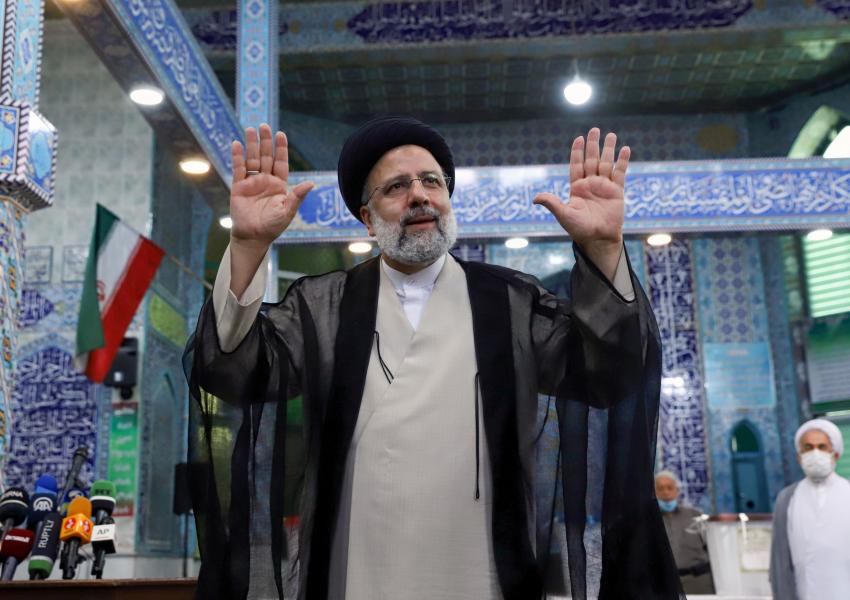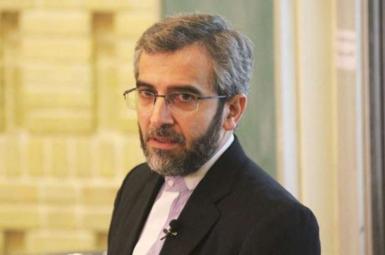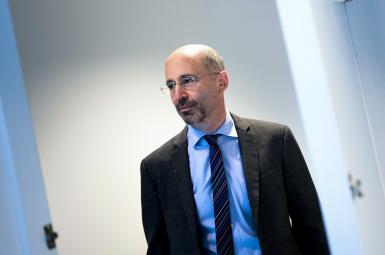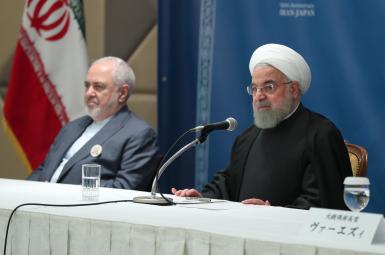
Ebrahim Raisi Center-Stage In Iran, While Also An Issue In Vienna
Iran’s election day comes with its nuclear talks with world powers in Vienna in a sixth round and with the June 24 expiry drawing near of current arrangements for United Nations inspectors to monitor Tehran’s atomic program.
While the election front-runner, Chief Justice Ebrahim Raisi (Raeesi), said in one presidential debate he would support efforts in Vienna to revive Iran’s 2015 nuclear deal, the JCPOA, if in “the people’s interests,” Raisi himself has already figured in the talks.
Among disagreements between Iran and the United States, who participate indirectly in Vienna, is Washington’s sanctioning of Raisi, an analyst with knowledge of talks’ participants has told Iran International. This opens to sanctions not just Raisi, but anyone dealing with him.
Raisi was ‘designated’ in November 2019 under President Donald Trump’s Executive Order 13876 of June 24, 2019, which designated Iran’s supreme leader and his office, and authorized sanctions “on others associated” with the leader or his office. The US designated Foreign Minister Mohammad Javad Zarif under the same executive order on July 31.
Trump-Era Sanctions
The designations cut to central issues in the Vienna talks, aimed at reviving Iran’s 2015 nuclear deal with world powers, the JCPOA (Joint Comprehensive Plan of Action). The talks, beginning in April, aim at removing US sanctions incompatible with the deal and reversing Iran’s nuclear steps since 2019 beyond JCPOA limits.
Both areas, examined by expert groups, offer challenges. Iran’s atomic program has changed qualitatively and not just quantitively, ruling out a simple return to JCPOA limits.
And while the US says it will lift sanctions incompatible with the JCPOA – sometimes called nuclear sanctions – it has said it could keep other sanctions, including some introduced by Trump after he withdrew the US from the JCPOA in 2018.
But Tehran has pointed out that Trump officials openly stated that many of these sanctions, ostensibly over ‘human rights’ or ‘terrorism,’ were designed to hinder a successor in reviving the JCPOA.
Agreement With Allies
In a press briefing Thursday, State Department spokesman Ned Price ruled out giving any “play-by-play” account of the talks, stressing the Biden administration’s general commitment to restoring the deal.
Price said the US was in “full agreement there with our allies and partners in the context of the P5+1” [the permanent members of the UN Security Council plus Germany, also the original JCPOA signatories] in seeking “a compliance-for-compliance outcome – that is to say, where Iran is once again subject to the most intrusive inspection and monitoring regime ever negotiated, and the United States once again complies with our commitments under the 2015 JCPOA.”
Price’s emphasis on consensus and multilateral agreement reflects President Joe Biden repairing US relations with Europe. But while Iran’s nuclear expansion has also brought Europe’s approach to Iran closer to Washington, it is far from clear how far Europe would go in agreeing to continue Trump-era sanctions, including the Raisi designation.
It is unlikely that Russia and China would do so. Both Moscow and Beijing have placed the onus with JCPOA revival on the US lifting its sanctions, as the party that left the deal.
While the Biden administration has said that it wants “follow-on” agreement with Iran, once the JCPOA is back in place, covering of regional security and defense, reaching agreement with other powers could prove a bigger challenge.
Price insisted Thursday the US was prepared to “leverage applicable authorities, including sanctions, against any actor that enables Iran’s ongoing provision of weapons to violent partners and proxies around the world.” There has been disquiet in the US Congress not just over Iran’s relations with Venezuela but over training Hamas fighters in besieged Gaza in the use of rockets.
But a 13-year UN arms embargo against Iran expired in October 2020, although the Trump administrations claimed it was still in force, leaving Iran as free to trade in weapons as any other state, including neighbors who buy advanced weapons from the US.
Loss of Data
Iran meanwhile continues to enrich uranium to 60 percent, way above the JCPOA limit of 3.67 percent. Rafael Mariano Grossi, the head of the UN’s International Atomic Energy Agency (IAEA), told Bloomberg TV Thursday he had not as yet received word that Iran would extend current access arrangements – based on a three-month agreement he reached in February, extended in May for a month − expiring June 24.
Grossi stressed that whatever happened in the Iranian election or in Vienna, the IAEA needed “continuity of a minimum level of verification.” He warned that without the current arrangements, data gathered since February would be lost, inflicting “considerable damage” on the agency’s ability to monitor Iran’s nuclear activities.








